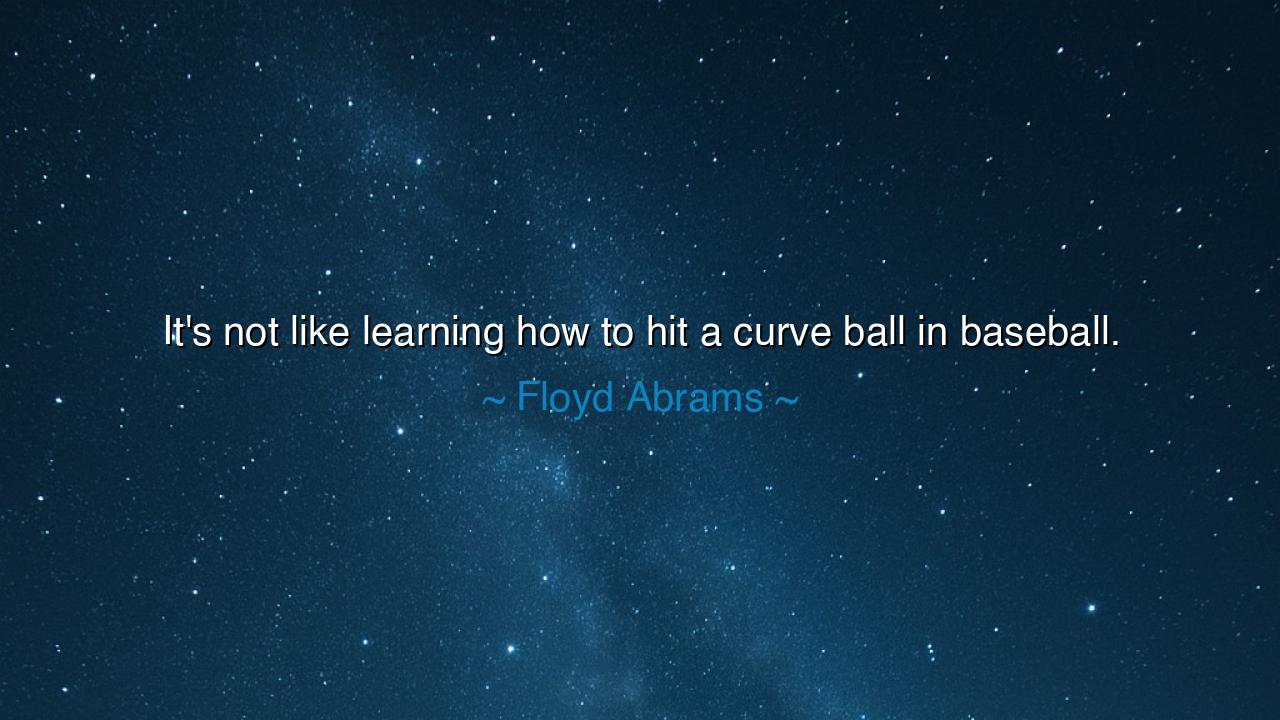
It's not like learning how to hit a curve ball in baseball.






Floyd Abrams, the great defender of the First Amendment, once declared: “It’s not like learning how to hit a curve ball in baseball.” His words, though simple in their imagery, strike deep when understood. For Abrams was no athlete upon the diamond, but a warrior in the courts of law. By this saying he sought to remind us that certain matters—the defense of liberty, the understanding of justice, the safeguarding of truth—cannot be reduced to the training of the body, the repetition of a skill, or the mechanics of sport. They require instead something greater: a shaping of spirit, a discipline of mind, and a courage of heart.
The meaning of this quote lies in contrast. To learn to hit a curve ball is to master a predictable though difficult craft, one that can be practiced through repetition until reflexes are honed. But Abrams speaks of work that is not so easily learned, for it cannot be taught solely by drills or repetition. The defense of freedom, the pursuit of justice, the great battles of public life—these are not games, but living struggles where each moment is new, each challenge unprecedented. Thus, his words warn us: do not imagine that defending truth is as straightforward as practicing for sport.
The origin of this statement is found in Abrams’ long career as a constitutional lawyer, where he often defended the freedom of speech in times of crisis. He knew that each case was unique, carrying new circumstances, new dangers, new interpretations of ancient principles. Unlike the athlete who can rely on a repeated pattern, the lawyer, the judge, the citizen must confront every battle with fresh eyes and sharpened wisdom. To say “it’s not like baseball” is to remind us that the stakes are higher, the field ever-changing, and the lessons not simple drills but profound truths written through struggle.
History offers us clear examples. Consider the trial of John Peter Zenger in 1735, when a colonial printer was charged with libel for criticizing the governor of New York. There were no rehearsed plays, no predictable pitches—only the raw confrontation between power and truth. His acquittal, defended by arguments of freedom and the right to criticize authority, became a foundation for the liberty later enshrined in the First Amendment. Such a victory was not the result of practiced reflex, but of courage and clarity in an unprecedented moment. Abrams, like Zenger’s defenders, understood that defending liberty demands thought beyond the mechanical.
There is something deeply emotional in his metaphor, for it reminds us that the struggles that matter most are never routine. The athlete may face the pressure of the crowd and the speed of the ball, but the lawyer defending freedom, or the citizen standing for justice, faces the weight of history, the silence of the oppressed, the possibility that truth itself may be silenced. Abrams’ words strip away any illusion that the defense of principle is easy. They call us to seriousness, to reverence, to the recognition that some tasks demand all that we are.
To future generations, his saying offers both warning and encouragement. The warning: do not treat the defense of liberty as a pastime, a game, or a practice in reflex. It is work that demands full dedication, humility, and courage. The encouragement: though it is not simple, it is noble, and those who commit themselves to it share in the legacy of those who came before—men and women who stood for truth, even when the path was uncharted.
The lesson is this: honor the weight of the struggles you face. Practically, this means preparing your mind and conscience, not just your reflexes; reading deeply, reflecting honestly, and listening humbly before acting. It means approaching the great issues of freedom, justice, and truth with reverence, as one who knows they are not predictable drills but living battles that shape the destiny of nations.
Thus Floyd Abrams’ words endure: “It’s not like learning how to hit a curve ball in baseball.” Let us take them as a call to remember that life’s greatest duties cannot be mastered through rote practice alone. They require wisdom, courage, and perseverance in the face of the unknown. For though the curve ball may confound the batter, the trials of liberty test the soul—and those who rise to meet them keep alive the flame of justice for all who follow.






AAdministratorAdministrator
Welcome, honored guests. Please leave a comment, we will respond soon